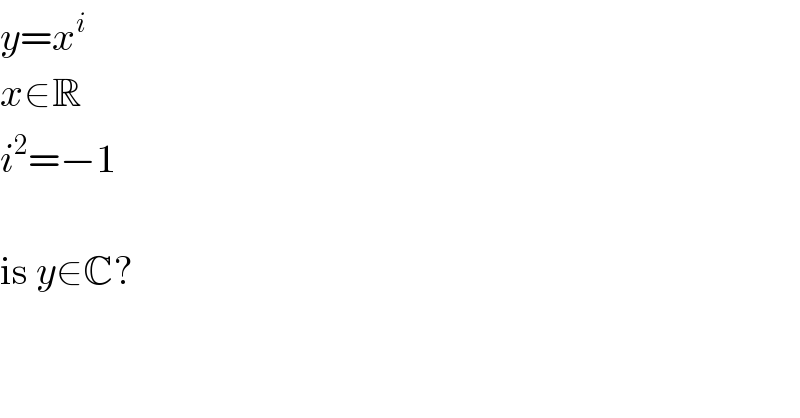
Question Number 4555 by FilupSmith last updated on 07/Feb/16

$${y}={x}^{{i}} \\ $$$${x}\in\mathbb{R} \\ $$$${i}^{\mathrm{2}} =−\mathrm{1} \\ $$$$ \\ $$$$\mathrm{is}\:{y}\in\mathbb{C}? \\ $$
Commented by Yozzii last updated on 07/Feb/16

$${All}\:{known}\:{numbers}\:{are}\:{members}\:{of} \\ $$$$\mathbb{C}\:{since}\:\mathbb{C}=\mathbb{R}\cup\left\{{wholly}\:{complex}\:{numbers}\right\}. \\ $$$$\mathbb{C}\:{is}\:{unbounded}\:{and}\:{open}.\: \\ $$$$ \\ $$
Commented by FilupSmith last updated on 07/Feb/16

$$\mathrm{Then},\:\mathrm{more}\:\mathrm{spesifically},\:{is}\:{y}\in\mathbb{R}? \\ $$
Commented by Yozzii last updated on 07/Feb/16

$${y}\:{could}\:{be}\:{real}\:{or}\:{complex}. \\ $$$${x}\in\mathbb{R} \\ $$$${If}\:{x}>\mathrm{0},\:{x}={e}^{{lnx}} \Rightarrow{x}^{{i}} ={e}^{{ilnx}} ={y} \\ $$$${x}^{{i}} ={cos}\left({lnx}\right)+{isin}\left({lnx}\right) \\ $$$${If}\:{y}={x}^{{i}} \in\mathbb{R}\Rightarrow{sin}\left({lnx}\right)=\mathrm{0} \\ $$$$\Rightarrow{lnx}={n}\pi\Rightarrow{x}={e}^{{n}\pi} \:\left({n}\in\mathbb{Z}\right). \\ $$$${If}\:{y}={x}^{{i}} \in\left\{{wholly}\:{complex}\right\}\Rightarrow{cos}\left({lnx}\right)=\mathrm{0} \\ $$$$\therefore{lnx}=\mathrm{2}{n}\pi\pm\mathrm{0}.\mathrm{5}\pi\Rightarrow{x}={e}^{\mathrm{2}{n}\pi\pm\mathrm{0}.\mathrm{5}} \:\left({n}\in\mathbb{Z}\right). \\ $$$${For}\:{x}>\mathrm{0},\:{x}\neq{e}^{{n}\pi} \:{and}\:{x}\neq{e}^{\mathrm{2}{n}\pi\pm\mathrm{0}.\mathrm{5}} ,\:{y}\in\mathbb{C}.\: \\ $$$$ \\ $$$${If}\:{x}<\mathrm{0}\:{let}\:{x}=−{a},\:{a}>\mathrm{0}\:\:\left({a}\in\mathbb{R}\right) \\ $$$$\Rightarrow{x}=−{a}={a}\left({cos}\pi+{isin}\pi\right)={ae}^{\pi{i}} \\ $$$${x}={e}^{{ln}\left({ae}^{{i}\pi} \right)} ={e}^{{lna}+{i}\pi} \\ $$$$\Rightarrow{x}^{{i}} ={e}^{{ilna}+{i}^{\mathrm{2}} \pi} ={e}^{{ilna}−\pi} ={e}^{−\pi} \left({cos}\left({lna}\right)+{isin}\left({lna}\right)\right) \\ $$$${So},\:{similarly}\:{for}\:{x}<\mathrm{0},\:{y}\in\mathbb{R}\:{or}\:{y}\in\mathbb{C}. \\ $$$$ \\ $$$${I}\:{don}'{t}\:{think}\:{y}\:{is}\:{defined}\:{for}\:{x}=\mathrm{0}. \\ $$$$ \\ $$$$ \\ $$
Commented by Yozzii last updated on 07/Feb/16

$${Let}'{s}\:{consider}\:{the}\:{general}\:{form}\: \\ $$$${y}=\left({a}+{bi}\right)^{{c}+{id}} \:{where}\:{i}^{\mathrm{2}} =−\mathrm{1}, \\ $$$${a},{b},{c},{d}\in\mathbb{R},\:{and}\:{if}\:{a}={b},\:{then}\:{a}\neq\mathrm{0}\:{for} \\ $$$${if}\:{a}={b}=\mathrm{0},\:{y}\:{is}\:{undefined}\:{since}\:{arg}\left(\mathrm{0}\right) \\ $$$${is}\:{undefined}.\: \\ $$$$ \\ $$$${In}\:{modulus}−{polar}\:{form}, \\ $$$$\:\:\:\:\:\:\:\:\:\:\:\:\:\:\:\:\:{a}+{bi}={re}^{{i}\theta} \\ $$$${where}\:{r}=\sqrt{{a}^{\mathrm{2}} +{b}^{\mathrm{2}} }\:,{r}>\mathrm{0},\:{and}\:\theta\:,\:−\pi<\theta\leqslant\pi,\:{is}\:{the}\: \\ $$$${principal}\:{argument}\:{of}\:{the}\:{complex}\:{number} \\ $$$${a}+{bi}.\:{e}\:{is}\:{Euler}'{s}\:{constant}. \\ $$$$\therefore\:{y}=\left({re}^{{i}\theta} \right)^{{c}+{id}\:} ={r}^{{c}+{id}} {e}^{{i}\theta\left({c}+{id}\right)} \\ $$$${y}={r}^{{c}} \left({r}^{{d}} \right)^{{i}} {e}^{{ci}\theta−\theta{d}} ={r}^{{c}} {e}^{−\theta{d}} \left({r}^{{d}} {e}^{{c}\theta} \right)^{{i}} ={nx}^{{i}} \\ $$$${where}\:{n}={r}^{{c}} {e}^{−\theta{d}} >\mathrm{0},\:{x}={r}^{{d}} {e}^{{c}\theta} >\mathrm{0}, \\ $$$${n},{x}\in\mathbb{R}. \\ $$$${y}={n}\left({e}^{{lnx}} \right)^{{i}} ={ne}^{{ilnx}} ={n}\left({cos}\left({lnx}\right)+{isin}\left({lnx}\right)\right) \\ $$$${y}={ncos}\left({lnx}\right)+{insin}\left({lnx}\right) \\ $$$${From}\:{this}\:{we}\:{know}\:{that}\:\mid{y}\mid={n}={r}^{{c}} {e}^{−\theta{d}} \\ $$$${and}\:{arg}\left({y}\right)={lnx}={ln}\left({r}^{{d}} {e}^{{c}\theta} \right)={c}\theta+{dlnr}. \\ $$$$ \\ $$$$\left(\mathrm{1}\right)\:{If}\:{y}\:{is}\:{real}\Rightarrow{nsin}\left({lnx}\right)=\mathrm{0} \\ $$$$\Rightarrow{lnx}={t}\pi\Rightarrow{x}={e}^{{t}\pi} ,\:{t}\in\mathbb{Z}.\: \\ $$$$\therefore\:{y}={ncos}\left({lnx}\right)={r}^{{c}} {e}^{−\theta{d}} {cos}\left({lne}^{{t}\pi} \right) \\ $$$${y}=\left({a}^{\mathrm{2}} +{b}^{\mathrm{2}} \right)^{\frac{{c}}{\mathrm{2}}} {e}^{−{d}\theta} {cost}\pi \\ $$$${y}=\left(−\mathrm{1}\right)^{{t}} {e}^{−{d}\theta} \left({a}^{\mathrm{2}} +{b}^{\mathrm{2}} \right)^{{c}/\mathrm{2}} ,{t}\in\mathbb{Z}. \\ $$$$\left\{{Since}\:{x}={r}^{{d}} {e}^{{c}\theta} \:{and}\:{x}={e}^{{t}\pi} \Rightarrow{e}^{{t}\pi} ={r}^{{d}} {e}^{{c}\theta} \right. \\ $$$$\therefore{t}\pi={dlnr}+{c}\theta \\ $$$${t}=\frac{{dlnr}+{c}\theta}{\pi}\in\mathbb{Z} \\ $$$$\left.{Is}\:{it}\:{necessary}\:{for}\:{t}\in\mathbb{Z}\:{that}\:{r}=\mathrm{1}?\right\} \\ $$$$ \\ $$$$\left(\mathrm{2}\right){If}\:{y}\:{is}\:{wholly}\:{complex}\Rightarrow\:{ncos}\left({lnx}\right)=\mathrm{0} \\ $$$$\Rightarrow{lnx}=\mathrm{2}{t}\pi\pm\mathrm{0}.\mathrm{5}\pi\Rightarrow{x}={e}^{\mathrm{2}{t}\pi\pm\mathrm{0}.\mathrm{5}\pi} ,{t}\in\mathbb{Z} \\ $$$$\therefore\:{y}={nisin}\left(\mathrm{2}{t}\pi\pm\mathrm{0}.\mathrm{5}\pi\right) \\ $$$${y}={ni}\left({sin}\mathrm{2}{t}\pi{cos}\mathrm{0}.\mathrm{5}\pi\pm{sin}\mathrm{0}.\mathrm{5}\pi{cos}\mathrm{2}{t}\pi\right) \\ $$$${y}=\pm{ni}=\pm{r}^{{c}} {e}^{−\theta{d}} {i} \\ $$$${x}={r}^{{d}} {e}^{{c}\theta} \:\therefore\:{r}^{{d}} {e}^{{c}\theta} ={e}^{\mathrm{2}{t}\pi\pm\mathrm{0}.\mathrm{5}\pi} \\ $$$${dlnr}+{c}\theta=\mathrm{2}{t}\pi\pm\mathrm{0}.\mathrm{5}\pi \\ $$$${t}=\frac{{dlnr}+{c}\theta\pm\mathrm{0}.\mathrm{5}\pi}{\mathrm{2}\pi}\in\mathbb{Z} \\ $$$$\left(\mathrm{3}\right){For}\:{r}^{{d}} {e}^{{c}\theta} \neq{e}^{\left(\mathrm{2}{t}\pm\mathrm{0}.\mathrm{5}\right)\pi} ,{e}^{{q}\pi} \:{where} \\ $$$${t},{q}\in\mathbb{Z},\:{Im}\left({y}\right)\neq\mathrm{0}\:{and}\:{Re}\left({y}\right)\neq\mathrm{0}\:{and}\:{has}\:{the}\:{form}\: \\ $$$${y}={r}^{{c}} {e}^{−{d}\theta} \left({cos}\left({c}\theta+{dlnr}\right)+{isin}\left({c}\theta+{dlnr}\right)\right) \\ $$$${Re}\left({y}\right)=\left({a}^{\mathrm{2}} +{b}^{\mathrm{2}} \right)^{\frac{{c}}{\mathrm{2}}} {e}^{−{d}\theta} {cos}\left({c}\theta+\frac{\mathrm{1}}{\mathrm{2}}{dln}\left({a}^{\mathrm{2}} +{b}^{\mathrm{2}} \right)\right) \\ $$$${Im}\left({y}\right)=\left({a}^{\mathrm{2}} +{b}^{\mathrm{2}} \right)^{\frac{{c}}{\mathrm{2}}} {e}^{−{d}\theta} {sin}\left({c}\theta+\frac{\mathrm{1}}{\mathrm{2}}{dln}\left({a}^{\mathrm{2}} +{b}^{\mathrm{2}} \right)\right) \\ $$$$ \\ $$
Commented by FilupSmith last updated on 07/Feb/16

$$\mathrm{Wow}!\:\mathrm{This}\:\mathrm{is}\:\mathrm{amazing}\:\mathrm{and}\:\mathrm{very}\:\mathrm{interesting}! \\ $$$$\mathrm{I}\:\mathrm{love}\:\mathrm{it}! \\ $$
